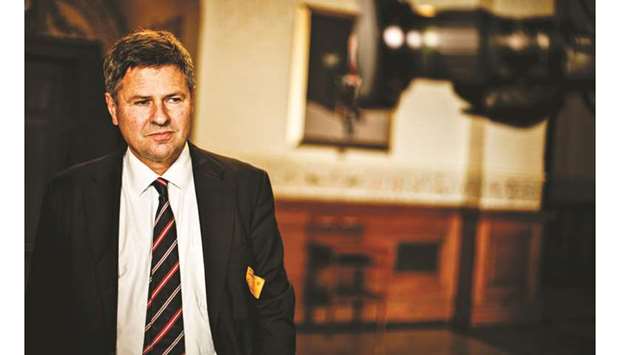Europe’s worst ever money-laundering saga might not have been quite as bad if regulators had given banks access to some key data.
Jesper Berg, the head of the watchdog that oversees Danske Bank, says the $220bn scandal that has engulfed Denmark’s biggest financial firm continues to offer lessons from which Europe can learn.
“The biggest tragedy in relation to Danske was the customers who left Danske in 2015, that they could walk across the street or to some other country, and could continue their business,” Berg said in an interview in Copenhagen.
Berg is hoping the European Union will take note and consider creating a database of potentially suspicious customers. Such information would limit the spread of laundering and terror financing, because banks that checked the database would be forewarned, he said.
The Danish regulator is speaking out as Europe’s finance chiefs are set to call on the European Commission to create a new agency intended to fight money laundering. But there’s so far no agreement on what the agency will do, including on thorny issues like law enforcement. (Denmark is among countries resisting involving European authorities in law enforcement.)
Banks are legally obligated to report suspicious activity to so-called FIUs, or financial intelligence units. Countries are supposed to create the agencies to receive and analyse suspicious transactions.
“There have been a lot of discussions on how the EU could contribute in this area, and I think the one way which would make a difference would be in relation to helping set up this database, this infrastructure,” Berg said.
Such a database might collide with European data privacy regulations. That’s why the creation of the repository needs to be done at a European level, where those conflicts can be addressed, Berg said. Safeguards against false positives and who would own and operate the system would also need to be considered.
The bank published a tell-all report late last year, in which it admitted that it hadn’t properly screened about €200bn ($220bn) in non-resident flows that went through its Estonian unit between 2007 and 2015. Danske said there was a risk that a large part of those flows were suspicious. The bank is now being investigated in Denmark, Estonia, France and the US and its erstwhile CEO, along with several other former executives, has had preliminary criminal charges brought against him.
Banks have plowed billions of dollars into compliance and anti-money laundering defences since revelations of widespread laundering surfaced. Danske now employs more than 1,200 in anti-crime positions.
Denmark’s banks have asked for a shared system to evaluate and register customers. Linda Nielsen, chairman of an anti-money laundering task force for the financial industry, says it’s still far too easy for potential criminals to move their accounts if one bank shuts them out.
“What happens today is that one bank says no to on-boarding a customer and then they see the customer walk across the street to another bank, which starts over again,” she said.
Meanwhile, growing compliance costs are weighing down an industry already under pressure from negative interest rates. In Denmark, where Danske is based, rates have been below zero since 2012, a world record.
Berg says that the difficult operating environment banks currently face adds to the urgency of improving anti-money laundering efforts. Europe keeps revising the anti-money directive, first introduced in 1990. But substantial changes have yet to be made, he said.

Jesper Berg, the head of the watchdog that oversees Danske Bank, attends a parliamentary hearing into the Danske Bank money laundering scandal in Copenhagen (file). u201cThe biggest tragedy in relation to Danske was the customers who left Danske in 2015, that they could walk across the street or to some other country, and could continue their business,u201d Berg said in an interview.
